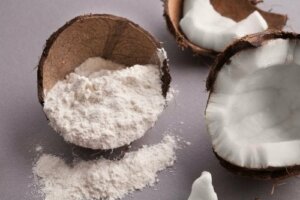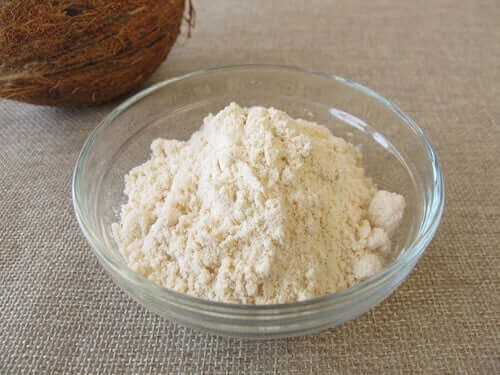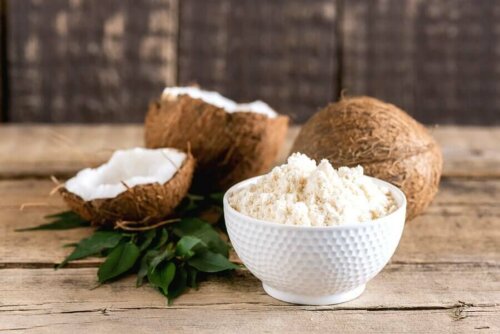5 Nutritional Benefits of Coconut Flour


Written and verified by the nutritionist Eliana Delgado Villanueva
Coconut is all the rage nowadays. In fact, increasingly more people are using coconut oil or milk in their recipes in order to make them healthier. Today, we’ll talk about coconut flour, an ingredient that has become essential in fitness recipes and vegan dishes.
This type of flour can replace other flours, such as white flour. This way, you can make pastries such as cakes or muffins healthier, high in dietary fiber, and lower in carbohydrates and calories.
What’s coconut flour?
Coconut flour is a nutritious food, as it’s 50% dietary fiber, proteins, and minerals. In addition, the most important thing is that it’s low in carbohydrates and starch and the fat it contains is totally healthy. It tastes and smells delicious and is also very nutritious.
We decided to highlight the following characteristics of coconut flour:
- It’s a good alternative to wheat flour, as it’s gluten- and lactose-free.
- It contains about 45% fiber. Thus, it may favor intestinal transit.
- It’s rich in good fats. According to an article published in the journal Progress in Cardiovascular Diseases, it contains a fatty acid called lauric acid. This fatty acid doesn’t negatively affect cardiovascular health and also increases good cholesterol levels.
- You need less of this flour to cook, which compensates for the fact that it’s more expensive than wheat flour.
- It’s suitable for vegans.

How to make coconut flour
As its name states, coconut is the main ingredient in coconut flour. To make this flour, you need natural and fresh coconut fruit. Then, press it to obtain coconut milk, and, finally, extract the oil.
Next, grate the completely dry coconut flesh until you get the final result, which is a fine flour. Coconut flour smells and tastes like coconut. It’s also naturally sweet and will make your desserts healthy.
This article may interest you: Chicken and Rice Marinated in Coconut Milk
Nutritional benefits of coconut flour
1. Rich in fiber
This product is rich in fiber. In fact, it contains 45 to 60 grams of fiber per 100 grams. It’s worth mentioning that coconut flour contains more fiber than wheat bran, chia grains, flax grains, oat bran, or prunes.
According to a study published in the International Journal of Clinical Practice, thanks to this characteristic, this product can aid intestinal transit. Also, it plays an important role in a balanced diet that aims to lower cholesterol and helps accelerate the feeling of fullness.
2. It contains trace elements
This product is rich in selenium, an interesting trace element due to its power to reduce the production of free radicals. 10 grams of coconut flour provide 21% of the Reference Daily Intake (RDI) for adults.
This coconut-derived ingredient is also rich in manganese. This trace element plays an important role in many nutrients. Specifically, vitamins B8, C, and B1 have great anti-free radical power.
In addition, it contains small amounts of iron. The body can’t synthesize this trace element, and so you must get iron from your diet.

3. It contains a high amount of lauric acid
This product contains lauric acid, which is a very particular saturated fatty acid. Lauric acid acts as a stimulant to activate the immune system and thyroid glands.
The antimicrobial properties of this fatty acid are being studied for viruses such as HIV, herpes, or measles. Additionally, several coconut fats are separated from the oil to be sold separately due to their high value. Lauric acid is sold to the industrial and pharmaceutical sectors.
4. It’s rich in protein
This is why it’s a satiating flour. Two tablespoons of coconut flour contain five grams of protein. The fat present in coconut flour will activate your metabolism to help you avoid storing fat and burn calories, which is why it’s healthy.
This article may interest you: Four Benefits of Including Coconut Water in Your Diet
5. It doesn’t contain gluten or cholesterol
Thanks to this, gluten-intolerant or sensitive people can consume it. A good piece of information for vegetarians and vegans is that it contains 20% protein and all eight essential amino acids. Coconut flour has a very low glycemic index: 35.
It’s low in fast sugars (14% compared to 70% in flours that also contain starch). Therefore, it’s perfect for those who are watching their blood glucose levels (diabetics and those who want to lose weight).
Add coconut flour to your desserts
In addition to its captivating aroma, it has health properties and benefits. That’s why you’ll do well to incorporate it into your diet if you want to follow a healthy lifestyle.
All cited sources were thoroughly reviewed by our team to ensure their quality, reliability, currency, and validity. The bibliography of this article was considered reliable and of academic or scientific accuracy.
- Santos HO., Howell S., Earnest CP., Teixeira FJ., Coconut oil intake and its effects on the cardiometabolic profile a structured literatura review. Prog Cardiovasc Dis, 2019. 62 (5): 436-443.
- Emmanuel A., Mattace Raso F., Neri MC., Petersen KU., Rey E., Rogers J., Constipation in older people: a consensus statement. Int J Clin Pract, 2017.
This text is provided for informational purposes only and does not replace consultation with a professional. If in doubt, consult your specialist.








